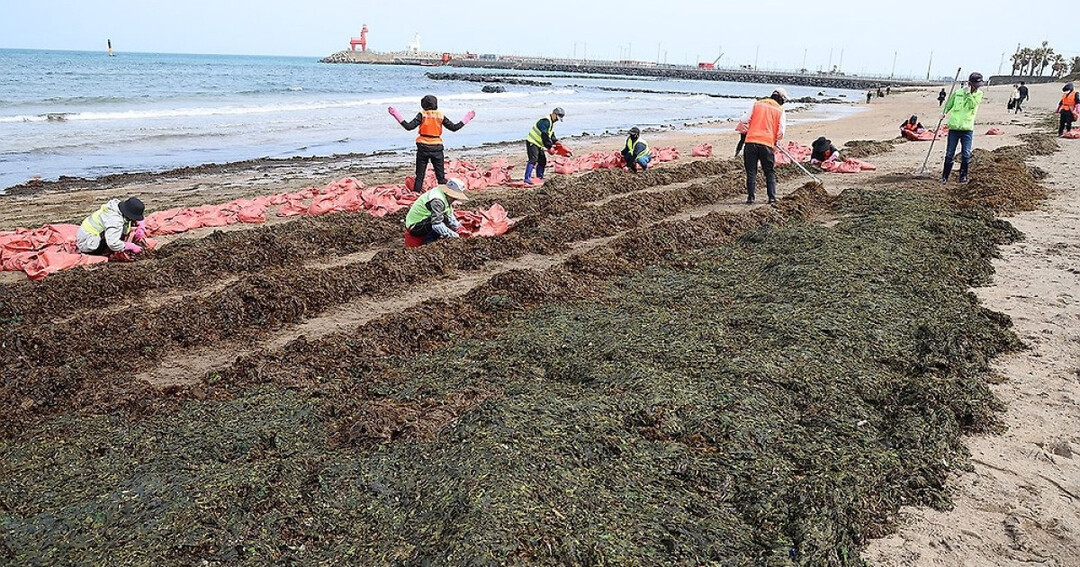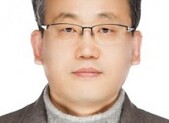
The idyllic shores of Jeju Island, renowned for their pristine white sands and azure waters, are currently facing an unusual environmental challenge: an overwhelming influx of seaweed. Tens of tons of brown seaweed, predominantly Undaria pinnatifida (wakame) and other species, have washed ashore on several of the island's popular beaches, transforming picturesque landscapes into sprawling carpets of marine vegetation. This massive accumulation is not only impacting the aesthetic appeal of these coastal areas but is also raising concerns about potential ecological consequences and the disruption of local tourism.
The phenomenon, which has intensified in recent weeks, has prompted local authorities and community volunteers to initiate extensive clean-up operations. However, the sheer volume of seaweed being deposited daily presents a significant logistical hurdle. Beaches that were once magnets for tourists and locals alike are now partially or entirely covered in thick layers of the slippery, decaying algae, emitting a pungent odor and hindering recreational activities.
While the presence of seaweed on beaches is a natural occurrence, the scale of the current influx on Jeju Island is unprecedented in recent memory. Experts and local fishermen are offering various theories to explain this surge. One prominent hypothesis suggests that recent changes in ocean currents, possibly influenced by shifts in weather patterns or larger climate phenomena, are playing a crucial role in concentrating and directing the seaweed towards Jeju's coastline. Additionally, fluctuations in water temperature and nutrient levels in the surrounding waters could be contributing to an increased growth and detachment of seaweed populations offshore.
Undaria pinnatifida, the dominant species among the washed-up seaweed, is a brown alga that is commercially cultivated and also grows naturally in the waters around Korea, Japan, and China. While it is a valuable food source and a component of the marine ecosystem, its excessive accumulation on beaches can have several negative impacts.
Firstly, the decaying seaweed creates an unpleasant environment for beachgoers, deterring tourism which is a vital sector of Jeju's economy. The visual impact of vast stretches of brown algae detracts from the natural beauty that draws visitors to the island. Moreover, the decomposition process can release foul odors and potentially attract insects, further diminishing the beach experience.
Secondly, the thick layers of seaweed can smother intertidal organisms, disrupting the delicate balance of the coastal ecosystem. Small crustaceans, mollusks, and other invertebrates that inhabit the sand and rocks can be suffocated by the dense algal mats. This disruption at the base of the food web can have cascading effects on larger marine life that depend on these smaller organisms for sustenance.
Thirdly, the clean-up efforts themselves pose logistical and financial challenges. Removing tons of wet, heavy seaweed requires significant manpower, specialized equipment, and designated disposal sites. Local municipalities are allocating resources to address the immediate problem, but the sustainability and long-term costs of such recurring events are a growing concern. Environmental groups are advocating for more proactive and preventative measures, including research into the underlying causes of the seaweed blooms and the development of sustainable management strategies.
In response to the crisis, Jeju Special Self-Governing Province has mobilized teams of workers and volunteers to clear the affected beaches. Heavy machinery, such as excavators and tractors, are being deployed to collect the seaweed, which is then transported to designated areas for processing or disposal. However, the continuous arrival of new seaweed necessitates a sustained and coordinated effort.
Local communities are also actively participating in the clean-up initiatives, with residents and business owners joining forces to restore their beloved beaches. These volunteer efforts highlight the strong connection between the people of Jeju and their natural environment, as well as their determination to overcome this challenge.
The Jeju Research Institute and other marine science organizations are conducting studies to understand the specific species of seaweed involved, the potential causes of the massive influx, and the long-term ecological impacts. This research aims to provide a scientific basis for developing effective management strategies and mitigating future occurrences. Understanding the nutrient dynamics, water currents, and seaweed life cycles in the region is crucial for predicting and potentially preventing such large-scale wash-ups.
Furthermore, there are discussions about potential beneficial uses for the collected seaweed. While the immediate priority is removal, exploring options such as composting for agricultural use, extracting valuable biochemicals, or even utilizing it as a biofuel feedstock could offer a more sustainable approach to managing this natural resource in the long term. Research into these potential applications is ongoing.
The "war with Jeju beach seaweed," as the initial report aptly describes it, underscores the increasing pressures on coastal environments worldwide. Climate change, pollution, and altered oceanographic conditions are contributing to a range of unusual marine phenomena. The situation in Jeju serves as a stark reminder of the interconnectedness of marine ecosystems and the potential for significant disruptions with far-reaching consequences.
As the clean-up efforts continue, the focus remains on restoring the beauty and usability of Jeju's beaches. However, there is a growing recognition that addressing the root causes of this seaweed surge is essential for the long-term health of the island's environment and economy. The collaboration between local authorities, scientists, and the community will be crucial in navigating this challenge and ensuring the continued allure of Jeju's coastal treasures. The lessons learned from this event may also provide valuable insights for other coastal regions grappling with similar environmental issues.
[Copyright (c) Global Economic Times. All Rights Reserved.]



























